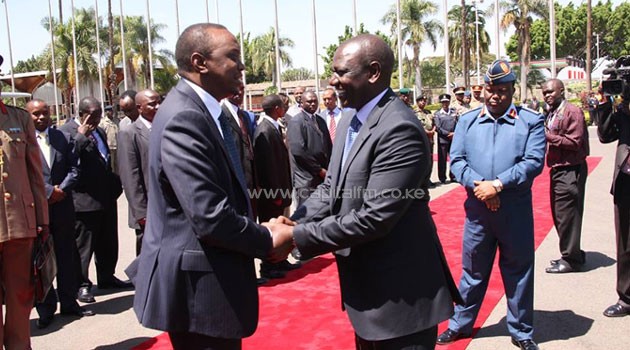
The Kenyan and Ethiopian delegations are also expected to discuss infrastructure – especially the Lamu Port and South Sudan-Ethiopia Transport (LAPSSET) Corridor project/FILE
During the President’s State visit – his first to an African country and second globally since his inauguration in April 2013 – he will meet Ethiopia’s President Mulatu Teshome and hold bilateral talks with Prime Minister Hailemariam Desalegn.
Thereafter, he will attend an IGAD summit where regional security matters will be discussed.
President Kenyatta’s first State visit was to China in August 2013.
The Head of State has made other visits within Africa and beyond, but they have always been official, not State, occasions.
The Kenyan delegation at the bilateral exchange will include Cabinet Secretaries Joseph Ole Lenku, Raychelle Omamo, Prof Judy Wakhungu, Eng Michael Kamau, Davis Chirchir and Amb Amina Mohamed.
The talks will focus on regional peace and security. Kenya has been at the forefront in promoting stability in the region, and is playing a key role in the search for a lasting solution to the South Sudan conflict and the restoration of stability to Somalia.
Energy sharing will feature at the bilateral meeting following Ethiopia’s construction of the Gibe Dam III, which will produce additional hydroelectric power. Kenya expects to benefit from the new capacity, under the terms of a Power Purchase Agreement signed in 2012.
Given the anticipated effects of the construction of the dam on Lake Turkana and River Omo downstream, Kenya will also voice its concern regarding the project’s environmental impact.
The Kenyan and Ethiopian delegations are also expected to discuss infrastructure – especially the Lamu Port and South Sudan-Ethiopia Transport (LAPSSET) Corridor project. The LAPSSET project, launched in March 2012 is one of the flagship projects of Vision 2030, which the Jubilee Government is determined to see completed within the timeframe set.
Components of the project include the Lamu-South Sudan Ethiopia Road measuring 1,730 kilometres; a 2,240 kilometre oil Pipeline from Lamu to Isiolo, and then to Ethiopia; an oil refinery at Lamu to refine oil products for Kenya and Ethiopia; and a thirty-two berth modern port in Lamu which will be triple the size of Mombasa’s facility.
The State visit to Ethiopia will also see President Kenyatta and his host Prime Minister Desalegn attend and address the Kenya-Ethiopia Business Forum.
The Forum, which will bring together Kenyan and Ethiopian private sector leaders and executives, presents an opportunity for the two groups to interact, dialogue and exchange ideas on stepping up economic and commercial links for the benefit of the people of both countries.
In recognition of the important role played by the Diaspora in development, President Kenyatta will meet Kenyans living and working in Ethiopia to listen and respond to their proposals on how the Jubilee Government can improve their stay abroad.
President Kenyatta will conclude his visit to Addis Ababa on Thursday by attending the Inter-Governmental Authority on Development (IGAD) summit, which will discuss the situation in South Sudan. The President, who is also the Chairman of the East African Community, has often voiced his full support for a speedy resolution to the South Sudan crisis.
“Mine is to assure the people of South Sudan that your brothers and sisters in Kenya stand by you and stand in solidarity with you,” President Kenyatta said in Juba, after holding talks with President Salva Kiir in late February.
The crisis in Africa’s youngest nation has caused death and destruction of property while displacing many, including Kenyans who were working in South Sudan.
IGAD will review the progress in the implementation of previous pacts reached by South Sudan’s warring rivals, one of which is a cessation of hostilities agreement signed after a month-long first round of talks in Addis Ababa in January. A second round of talks wrapped up a few days ago after both sides agreed to a 20-day recess.
Also expected to feature on the agenda of the IGAD summit is the situation in Somalia – especially after the attack on Villa Somalia late last month.









































